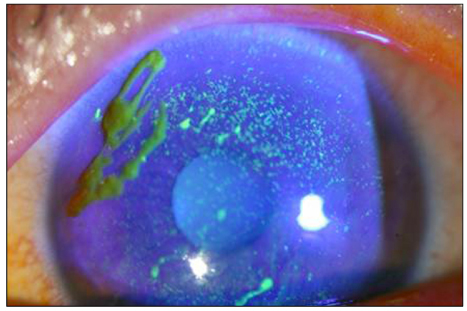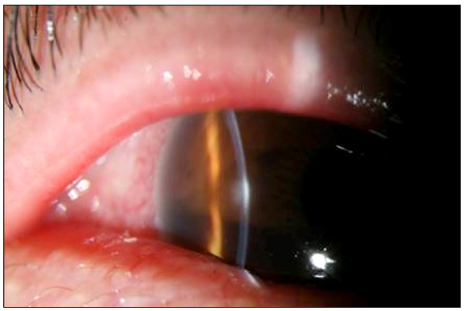J Korean Ophthalmol Soc.
2012 Aug;53(8):1163-1166. 10.3341/jkos.2012.53.8.1163.
Hafnia Alvei Keratitis after Using a Therapeutic Contact Lens in a Patient with Graft-Versus-Host Disease
- Affiliations
-
- 1Department of Ophthalmology, Kangwon National University School of Medicine, Chuncheon, Korea. uncontrolled@medimail.co.kr
- KMID: 2215961
- DOI: http://doi.org/10.3341/jkos.2012.53.8.1163
Abstract
- PURPOSE
To report a case of bacterial keratitis caused by Hafnia alvei after using a contact lens in a patient with graft-versus-host disease.
CASE SUMMARY
A 47-year-old male patient presented with a corneal ulcer. The patient had been wearing a therapeutic contact lens for a month because of severe dry eye syndrome and filament removal due to filamentary keratitis. The patient had been taking moxifloxacin to prevent infection, but had not for the previous 7 days. The corneal ulcer occurred at the 11 o'clock direction in the peripheral cornea accompanied by corneal epithelial defect and stromal infiltration. The corneal scraping and culture yielded Hafnia alvei, which is susceptible to ceftazidime, levofloxacin and moxifloxacin. There was no systemic signs or symptoms to suspect systemic infection. After treatment with a topical antibiotic agent, the patient's eye condition improved with only mild corneal opacity remaining.
CONCLUSIONS
Hafnia alvei infection rarely occurs in humans but should be considered as a potential causal pathogen in immunosuppressed patients.
MeSH Terms
Figure
Reference
-
1. Ferrara JL, Levine JE, Reddy P, Holler E. Graft-versus-host disease. Lancet. 2009. 373:1550–1561.2. Westeneng AC, Hettinga Y, Lokhorst H, et al. Ocular graft-versus-host disease after allogeneic stem cell transplantation. Cornea. 2010. 29:758–763.3. Tabbara KF, Al-Ghamdi A, Al-Mohareb F, et al. Ocular findings after allogeneic hematopoietic stem cell transplantation. Ophthalmology. 2009. 116:1624–1629.4. Franklin RM, Kenyon KR, Tutschka PJ, et al. Ocular manifestations of graft-vs-host disease. Ophthalmology. 1983. 90:4–13.5. Jabs DA, Hirst LW, Green WR, et al. The eye in bone marrow transplantation. II. Histopathology. Arch Ophthalmol. 1983. 101:585–590.6. Riemens A, te Boome L, Imhof S, et al. Current insights into ocular graft-versus-host disease. Curr Opin Ophthalmol. 2010. 21:485–494.7. Chiang KC, Ohmori N, Goto T. The search for immunosuppressive therapies to induce tolerance in organ transplantation. Endocr Metab Immune Disord Drug Targets. 2011. 11:173–180.8. Janda JM, Abbott SL. The genus Hafnia: from soup to nuts. Clin Microbiol Rev. 2006. 19:12–18.9. Ruiz-Moreno JM, Alió JL, de la Hoz F. Delayed-onset postoperative endophthalmitis caused by Hafnia alvei. Eur J Ophthalmol. 2001. 11:189–192.10. Savini V, Di Bartolomeo E, Catavitello C, et al. Graft versus host disease-related Hafnia alvei colonization and probable infection. J Med Microbiol. 2008. 57(Pt 9):1167–1169.11. Caravalho J Jr, McMillan VM, Ellis RB, Betancourt A. Endogenous endophthalmitis due to Salmonella arizonae and Hafnia alvei. South Med J. 1990. 83:325–327.12. Barry JW, Dominguez EA, Boken DJ, Preheim LC. Hafnia alvei infection after liver transplantation. Clin Infect Dis. 1997. 24:1263–1264.13. Conte M, Castagnola E, Venzano P, et al. Bacteremia caused by Hafnia alvei in a human immunodeficiency virus-infected child. Pediatr Infect Dis J. 1996. 15:182–183.14. Mojtabaee A, Siadati A. Enterobacter hafnia meningitis. J Pediatr. 1978. 93:1062–1063.15. Günthard H, Pennekamp A. Clinical significance of extraintestinal Hafnia alvei isolates from 61 patients and review of the literature. Clin Infect Dis. 1996. 22:1040–1045.16. Kulkarni S, Powles R, Treleaven J, et al. Chronic graft versus host disease is associated with long-term risk for pneumococcal infections in recipients of bone marrow transplants. Blood. 2000. 95:3683–3686.17. Witherspoon RP, Storb R, Ochs HD, et al. Recovery of antibody production in human allogenic marrow graft recipients: influence of time posttransplantation, the presence or absence of chronic graft-versus-host disease, and antithymocyte globulin treatment. Blood. 1981. 58:360–368.
- Full Text Links
- Actions
-
Cited
- CITED
-
- Close
- Share
- Similar articles
-
- A Case of Hafnia alvei Peritonitis with Septicemia
- A Case of Biliary Sepsis Caused by Hafnia Alvei in a Patient with Cholangiocarcinoma
- Spontaneous Bacterial Peritonitis Caused by Hafnia alvei in a Patient with Liver Cirrhosis
- Microbial Contamination of Contact Lens Storage Cases in Contact Lens-induced Keratitis Patients
- Pseudomonas Keratitis Due to Mishandling of Soft Contact lenses




